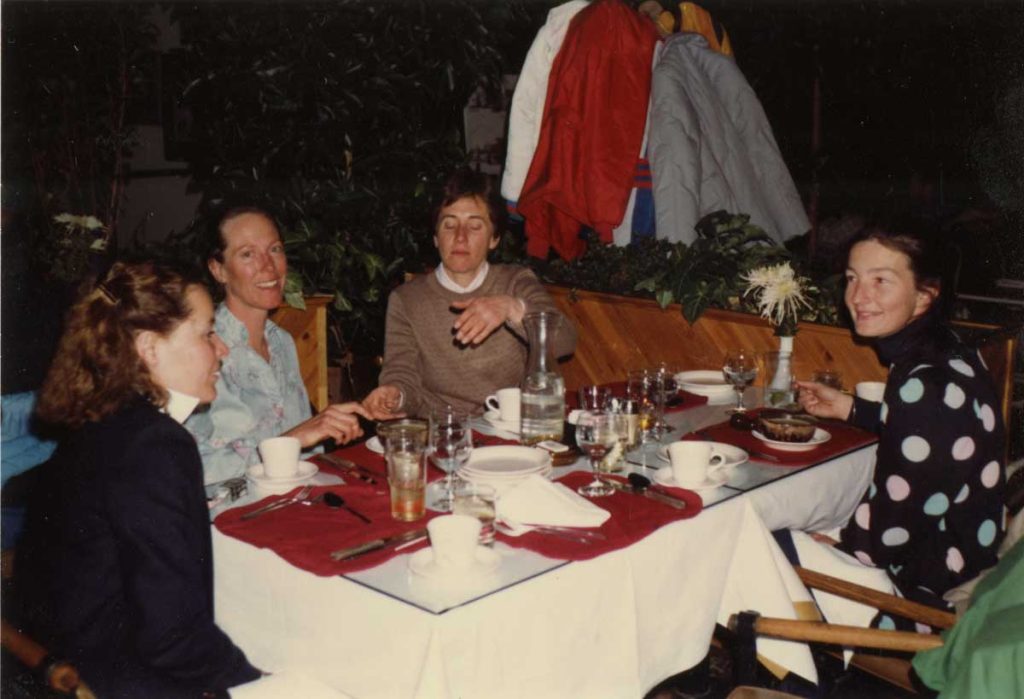Meeche White grew up with three cousins who are deaf. Her experiences with them in school gave her a passion to work as a teaching assistant, especially with students who had special classroom needs. But she began to notice that the structure of America’s school system was “a tough place… to facilitate growth and change,” as people with disabilities were often an afterthought and, therefore, most of the kids who needed extra attention and help accessing lessons and/or the school itself did not want to be there.
With that experience, White realized “it became – to me – obvious that the outdoors would be a really a powerful place to impact change.” So she got a degree in Therapeutic Recreation. She then got an internship in Winter Park, Colorado with their disabled skiing program and worked there for three years.
She and her husband at the time, Pete Badewitz, came to Park City in 1984, believing it would be the perfect place for a national program for disabled skiing and more. They then started the Park City Handicapped Sports Association (PCHSA) in their home in 1985. They helped with the International Special Olympics at Park City Ski Area that year, and were able to convince the resort of the opportunity for a disabled ski lesson program. That first year, they gave 45 lessons. The following year, it grew to 300. By 1999, they were giving almost 8,000 lessons.
That growth was extremely hard work. While the resort was ultimately supportive, they had been hesitant to partner with the PCHSA. Almost no one outside of Winter Park was running a program, and the Disability Rights Movement was still fresh, having really geared up in the late 1970s.
White related in an oral history that the resorts “can see value. But you have to prove who you are as an organization, and we also had to prove that these activities and these sports were safe and were therapeutic and did have value.” Park City Ski Area agreed to host the organization for their programs, but did not want to support it financially.
PCHSA got lucky, in a way, as they opened just as the Special Olympics were coming to Park City Ski Area. White noted, “it was good timing because… the community became very excited about the event, just poured its whole heart and soul into it… so we were able to pick up on that momentum of the community’s interest in facilitating activities for [people with disabilities]. We kind of rode that wave and got people involved. And, really, the community adopted us and took us in and really supported us.”

Credit: Park City Historical Society & Museum, Kathy Jones Collection
That passion turned into not just volunteering, but donations too, especially as wealthier people were moving to Park City in the 1990s and were looking for local charitable organizations to support. So Park City Ski Area provided a home base while the rest of the community helped the organization obtain financial security. White espoused, “I don’t look at going out and getting money. I go out and look at getting friends – people who attach to the mission. Obviously… you need money to write the checks and all those things, but I’ll tell you, of equal or even greater value is someone coming up and saying ‘gosh, I think what you do is great,’ or… ‘oh, thank you, you’ve made such a difference in our lives.’”
The National Ability Center is one of Park City’s (and this country’s) true gems. White stated, “We’re dedicated to the development of lifetime skills of people of all abilities. [We] provide quality, affordable sports and recreational experiences. The benefits of these experiences build self-esteem and confidence and enhance active participation in all aspects of community life.”
The NAC moved to their current location in 2001. White retired in 2008 after 23 years of building the organization. In 2017, the NAC joined with Splore, another local/regional organization organization focusing on the accessibility of outdoor adventure. Ground broke in August 2022 for a new $6.5 expansion at the NAC’s PCMR facility. The NAC has also helped dozens of athletes grow, train, and compete in the Paralympics and Special Olympics. Learn more about the NAC at discovernac.org.
The Park City Museum is currently hosting an exhibit on the Disability Rights Movement titled “Patient No More” through April 16 and a lecture related to the exhibit given by Dr. Emily Beitiks, the Iinterim Director of the Paul K. Longmore Institute on Disability at San Francisco State University. It will take place over Zoom on Wednesday, March 29 from 5 to 6 p.m. Contact Diane Knispel at education@parkcityhistory.org for a link to the lecture.
The Museum is also partnering with Park City Film for a showing of 2020 Sundance film Crip Camp, a documentary about a summer camp for people with disabilities and the impact it, and its campers and councilors, had on the Disability Rights Movement. The film will be shown on Thursday, April 6 at 7 p.m. It is rated R. For more information and to register, go to https://parkcityfilm.org/film/crip-camp/.